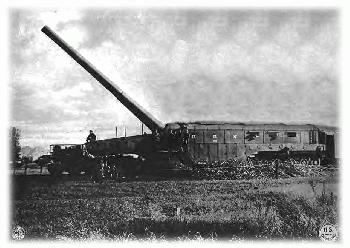World War One - Rail Guns

Illustrated with six photographs, this 1918 article is one of the first pieces of journalism to document the planning, construction, testing and deployment of the Railway Batteries that were manned by the U.S. Navy in W.W. I France.
"They dreamed a dream wherein a squadron of colossal trains, sheltered in armor plate, cruised constantly on dry land behind the battle lines. On each train a hundred bluejackets and their officers lived, ate, slept and worked the giant guns that rested upon mechanically perfect mounts and hurled explosive shells to the limit of their extreme ranges. In short, they dreamed the United States Naval Railway Batteries just as complete to the firing lines a few months later." Railway-mounted artillery can be dated to the 19th century, however their shining moment came during World War One, and the most notorious of these was the German manufactured "Paris Gun" which showed up in 1918 and was able to shell that city from as far as 75 miles away. which showed up in 1918 and was able to shell that city from as far as 75 miles away. The well-illustrated article attached herein first appeared a few months prior to the war's outbreak and concerns the railway gun that the French had on hand at the time: 7.87 inch, 6 inch and 4.7 inch howitzers which were intended for coastal defense. By 1916 both sides in the war would be deploying enormous rail-mounted naval guns, capable of delivering a far larger blow. Click here to read about the U.S. Navy railroad guns of W.W. I. A seven page recollection of the history of the US Navy Railway Artillery Reserve, penned by W.W I naval veteran Bill Cunningham, who served as an officer on one of her five rail-mounted batteries. The unit was lead in collaboration by a hard-charging U.S. Army artillery officer but commanded by Rear Admiral Charles Plunkett (1864 - 1931), a veteran of the Spanish-American War. Cunningham described his first encounter with the admiral, who he first mistook as a member of the YMCA: "I looked up to see a tall stranger approaching. He wore a pair of black, I said black, shoes beneath some badly rolled puttees. He didn't have on a blouse, but wore an enlisted man's rubber slicker open down the front, and badly rust-stained around the buckles. His battered campaign hat had no cord of any sort He was strictly the least military object we'd seen in a couple of years, if ever."
Click here to read about the woman who entertained the U.S. troops during the First World War.  |
An article written for an American veterans organization one year after the war, the attached piece tells the story of the five American naval batteries that were mounted on specially made rail cars and deployed along the Western Front. The article is two pages long and is filled with interesting facts as to the whereabouts of their assorted deployments and what was expected of the naval crews who worked them.
| | |
|